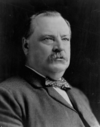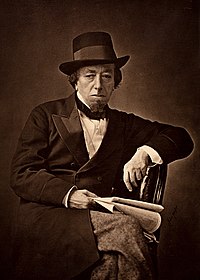Portal:Conservatism
| Main page | Showcase | Project |
Introduction
Conservatism is a cultural, social, and political philosophy and ideology, which seeks to promote and preserve traditional institutions, customs, and values. The central tenets of conservatism may vary in relation to the culture and civilization in which it appears. In Western culture, depending on the particular nation, conservatives seek to promote a range of institutions, such as the nuclear family, organized religion, the military, the nation-state, property rights, rule of law, aristocracy, and monarchy. Conservatives tend to favour institutions and practices that enhance social order and historical continuity.
Edmund Burke, an 18th-century Anglo-Irish statesman who opposed the French Revolution but supported the American Revolution, is credited as one of the forefathers of conservative thought in the 1790s along with Savoyard statesman Joseph de Maistre. The first established use of the term in a political context originated in 1818 with François-René de Chateaubriand during the period of Bourbon Restoration that sought to roll back the policies of the French Revolution and establish social order.
Conservatism has varied considerably as it has adapted itself to existing traditions and national cultures. Thus, conservatives from different parts of the world, each upholding their respective traditions, may disagree on a wide range of issues. Historically associated with right-wing politics, the term has been used to describe a wide range of views. Conservatism may be either libertarian or authoritarian, populist or elitist, progressive or reactionary, moderate or extreme. (Full article...)
Selected article
Selected quote
To be conservative, then, is to prefer the familiar to the unknown, to prefer the tried to the untried, fact to mystery, the actual to the possible, the limited to the unbounded, the near to the distant, the sufficient to the superabundant, the convenient to the perfect, present laughter to utopian bliss.
— Michael Oakeshott, On Being Conservative (1962)
Selected image
Benjamin Disraeli (1804 – 1881) was a British Prime Minister, parliamentarian, Conservative statesman and literary figure. Starting from comparatively humble origins, he served in government for three decades, twice as Prime Minister of the United Kingdom. Although his father had him baptised to Anglicanism at age 12, he was nonetheless Britain's first and thus far only Prime Minister who was born into a Jewish family—originally from Italy. He played an instrumental role in the creation of the modern Conservative Party after the Corn Laws schism of 1846.
Credit: Scewing
Did you know...
- ...that Ronald Reagan is the only president of the United States to have his diaries published into a best selling book?
- ...that the California Republican Assembly supported Tom McClintock in the 2003 California gubernatorial recall election?
- ... that Holby City woman is a voter demographic in the United Kingdom that was considered influential to the outcome of the 2010 United Kingdom general election?
Selected anniversaries in April
- 1960 – Barry Goldwater publishes The Conscience of a Conservative. The book reignited the American conservative movement and made Goldwater a star.
- 1948 – the period known as La Violencia begins with the assassination of Colombian Liberal Party leader Jorge Eliécer Gaitán. For the next ten years Liberals, Communists and Conservatives would fight each other in the conflict.
- 1980 – the first Washington for Jesus rally is held in Washington, D.C. It will become part of the burgeoning Christian Right movement.
Topics
Associated Wikimedia
The following Wikimedia Foundation sister projects provide more on this subject:
-
Commons
Free media repository -
Wikibooks
Free textbooks and manuals -
Wikidata
Free knowledge base -
Wikinews
Free-content news -
Wikiquote
Collection of quotations -
Wikisource
Free-content library -
Wikiversity
Free learning tools -
Wiktionary
Dictionary and thesaurus
- Portals that need updating
- Portals with minor issues in need of attention
- Portals with triaged subpages from November 2019
- All portals with triaged subpages
- All portals
- Portals with no named maintainer
- Conservatism portal
- Random portal component with 31–40 available subpages
- Random portal component with 6–10 available subpages
- Random portal component with 26–30 available image subpages
- Politics portals
- Conservatism









